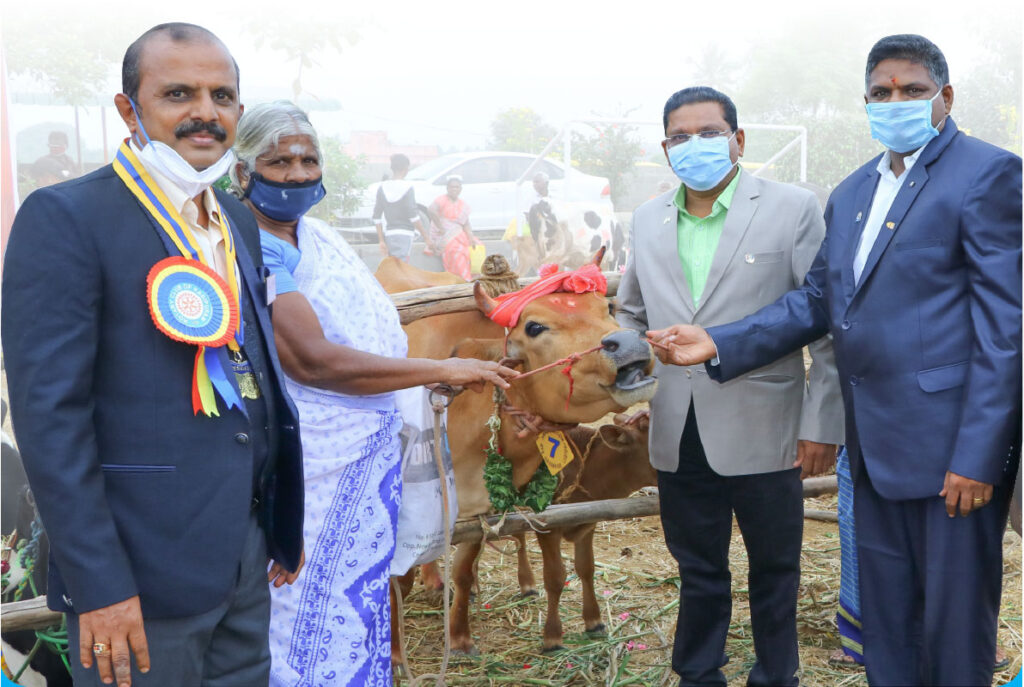Dark clouds of uncertainty and fear gripped Rathinam (60) at Kaatur village near Rasipuram, Namakkal district of Tamil Nadu, after she lost her only source of livelihood, an unskilled job, during the pandemic. “At my age, nobody will hire me to do any farm work. When I was terribly worried, it was the hand of providence and Rotarians who gave me this pregnant cow which delivered a healthy calf. I now deliver 10–12 litres of milk to households and my income has multiplied beyond my wildest dreams,” she explains.

Another heartwarming story comes from Padmavathi (38) from Masakalipatti village who never stops praising Rotary for giving her a healthy, pregnant cow. “My family is overjoyed and we will develop this gift into a big dairy farm. Thanks to Rotary, we have come out of poverty and looking forward to expand our milk business,” she smiles.
To celebrate 100 years of Rotary in India, RC Rasipuram, RID 2982, donated 108 pregnant cows to women living below the poverty line through a global grant project valued at ₹53.68 lakh, done jointly with RC Campo Mourao, Brazil, RID 4630, as its partner. While the project was conceived last year during the tenure of IPP A Thirumoorthi (known in the club as Ravi), the beneficiaries received their milch cows in a gala event presided over by club president S Kathiresan, with district collector K Megraj as chief guest.
Earlier, a six-member GG team of the club had toured 8–9 villages to do a community assessment need and “find out what the people really need to earn a sustainable income. We got guidance and help from VAOs and self-help groups,” said Rtn N P Ramaswamy, secondary contact of the Kamadhenu Cow Project.
“We asked them specifically about their basic requirements and put forth suggestions for honing their vocational skills like tailoring. But they rejected that idea, and sought help for purchasing milch cows,” he said. The survey team chose the beneficiaries, mostly widows and women above 30 years, hailing from impoverished families after verifying their social background.
Training session
The club arranged a four-day training programme for the chosen beneficiaries conducted by three professors from the Veterinary College and Research Institute, Namakkal. “Dairy farming and financial literacy were taught to them, along with practical training at the veterinary lab of the institute, which covered aspects like processing the value-added milk products and selling them either directly or through Aavin society and private vendors,” said Ramaswamy. A woman can earn up to ₹13,000–14,000 per month by rearing a cow, he estimates, adding that she will have to invest only three hours a day for taking care of the bovine.

Around seven years ago, the club donated goats by rotation to 150 poor women living at 7–8 villages near Rasipuram taluk with cash raised through members’ contributions. Following a commendation report by university officials, “the government took up the project with its own funding.” The cow donations have created a goodwill and “lifted the public image of Rotary in the nearby villages as our project gave a reliable source of livelihood to underprivileged families,” says Kathiresan. “We are double-happy as the Kamadhenu Project, our maiden global grant, was implemented on the silver jubilee year of our club.”
The global grant was sanctioned by TRF only after ascertaining various aspects such as the mode of selection of beneficiaries, their training and revenue yield. “This was a pioneering project in this region,” says IPDG A K Natesan. “It took 12 months to get the project sanctioned, for initially there were doubts about its sustainability in the long run.”
Noteworthy projects
Since 2005, the club has facilitated 117 free heart surgeries, mostly on poor children, with its member S Balaji tying up with private hospitals.
In another initiative, the club will be constructing a toilet for girls, set up a computer lab, RO water purifier and provide desks and benches to the Sacred Heart HS School, along with other facilities.
The funding with be through a GG valued at ₹25 lakh which is under the process of approval, says Kathiresan. “This Happy Schools project benefitting 800 students will be completed well before June.”
DG K S Venkatesan, PDG A K Natesan, ARRFCs S Vasu, Gopalakrishnan, RID 3000, DRFC K Babu, Veterinary College dean Dr B Mohan and Animal Husbandry regional joint director Dr V P Ponnuvel were at the event to mark the handover of livestock to the beneficiaries.






